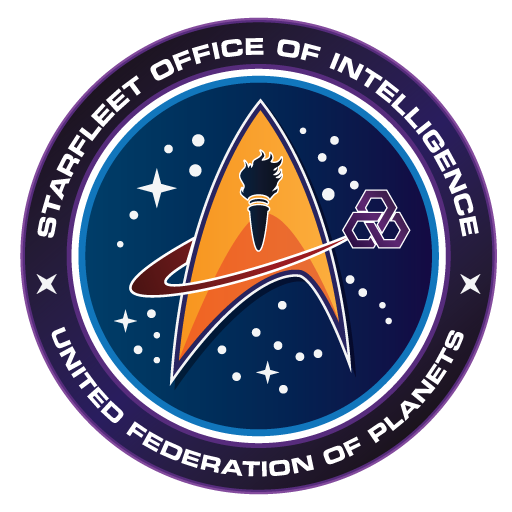¶ Writing an Intelligence Character

Starfleet Intelligence covers a vast amount of work in the field of Intelligence, ranging from undercover intelligence gathering to ensuring the cybersecurity of Starfleet's systems. The majority of officers who get posted to ships or starbases are Field Agents: jacks of all trades who have a wide understanding of the Intelligence field. Beyond that there are numerous different roles: people who serve as Intelligence's version of Security, hackers working to gain the upper-hand against a Federation enemy, or even engineers and scientists working in research and development to create new technology.
Those who serve in the Intelligence field do not study for this at Starfleet Academy. Intelligence actively scouts and recruits people from their home division, be that upon graduation or later in their Starfleet career. Some people are recruited from civilian roles, and others from other espionage organisations such as Section 31. There are even Intelligence officers who have committed crimes and instead of serving their time in jail, Starfleet has put their talents to good use and recruited them to serve their time in the fleet instead.
For those looking to write an Intelligence character, please note that the division is capped due to it being small and more exclusive than the others. There are currently 9/15 spaces taken. Below are a list of potential roles your Intelligence officer could serve as. You can be more niche within these too such as a Field Agent having a specialty in undercover operations. If you've got an idea, check with the admins to make sure it's okay!
¶ Field Agent
Field Agents make up the bulk of Intelligence's number of officers. The area of expertise focused on here is work in the field, as the name implies. This can be aboard a starship or starbase to serve in an Intelligence gathering/advisory post there - most people on postings are from the Field Division - or it could be as part of undercover work. Field Division officers are highly trained in covert operations and may also take part in critical operations, such as in hostage situations or in raids. Those serving within Field Division are jacks of all trades and can advise senior officers when an Intelligence aspect is required.
¶ Enforcement Officer
Enforcement Officers are Starfleet's Intelligence equivalent of law enforcement. Enforcement officers can be found in settings where there is high political tension so they can continually observe in case those tensions begin to spike. They may be dispatched to ships or starbases where there are a high number of possibly suspect people (e.g. officers who formerly served enemy factions) aboard. They also work to enforce the Prime Directive, Temporal Prime Directive, and the Omega Directive, and have a high knowledge of Starfleet regulations as well as Federation law. Similar to Field Agents, they may also take part in critical operations, and can advise senior officers when an Intelligence aspect is required.
¶ Research and Development (R&D) Officer
Research and Development (R&D) officers serve in the role of creating and distributing new technology, initially to Starfleet Intelligence and then to the wider fleet. Their work ranges from weaponry, armour, field equipment, and even out to starships which they produce for the Intelligence fleet, working with the likes of Utopia Planitia and the Starfleet Corps of Engineers to create specialised vessels designed for various Intelligence operations. People serving in this department generally do not serve on postings, but can be deployed to one if required (e.g. if new equipment needed field testing in a certain place).
¶ Cybersecurity (CYSEC) Officer
Cybersecurity (CYSEC) comprise the officers who maintain the security of Starfleet's computer systems, such as LCARS and the ship or starbase's internal computer. They are, effectively, responsible for the entirety of Starfleet's network, and work in conjunction with Starfleet Operations to ensure its continued functionality. Hackers may also be employed by CYSEC to work in an Intelligence gathering role, working to break the systems of enemy factions - or to test Starfleet's own, searching for any flaws in systems that may be exploited by those looking to cause serious damage. CYSEC officers can advise senior officers on cybersecurity-based operations.
¶ Crypto-Communications (CRCO) Officer
Crypto-Communications (CRCO) officers make up the modern equivalent of a SIGINT unit. The division's technicians work in tandem with Starfleet Communications in order to ensure the security and functionality of communications over long ranges. Cryptology as a whole is utilised by the division with people specialising in both cryptography (the creation of codes) and cryptanalysis (the breaking of codes). From Intelligence's HQ, relays, and listening posts throughout the Federation, they monitor both internal and external transmissions for continued intelligence gathering.
¶ Roleplaying an Intelligence Character
As there are a limited number of Intelligence officers on the same posting at any one time, they do not have an allocated division head on the ship/starbase. As a result, officers who have been deployed will report in remotely, be it to a manager or a handler should they be on a specific mission. When it comes to the discipline of officers in this field, higher-ranked officers on the posting can initially reprimand someone junior to them, but for anything severe it must go through their remote line manager.
Intelligence Officers can also report issues directly to the Security or Command departments if they discover anything that is pertinent to the security of the ship or starbase that they are serving on.
Like in other divisions, rank may sometimes be outweighed by experience. Like how in the Science division a sociologist would have more knowledge than a physicist in a social science case, this can be the same in Intelligence. For example, a Field Agent Lieutenant may have to defer to a Cybersecurity Ensign if the matter was more in their line of work and expertise.